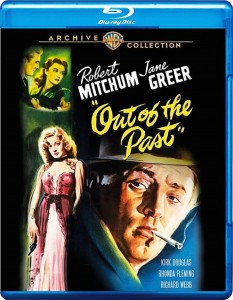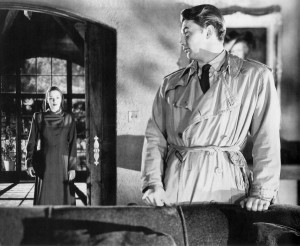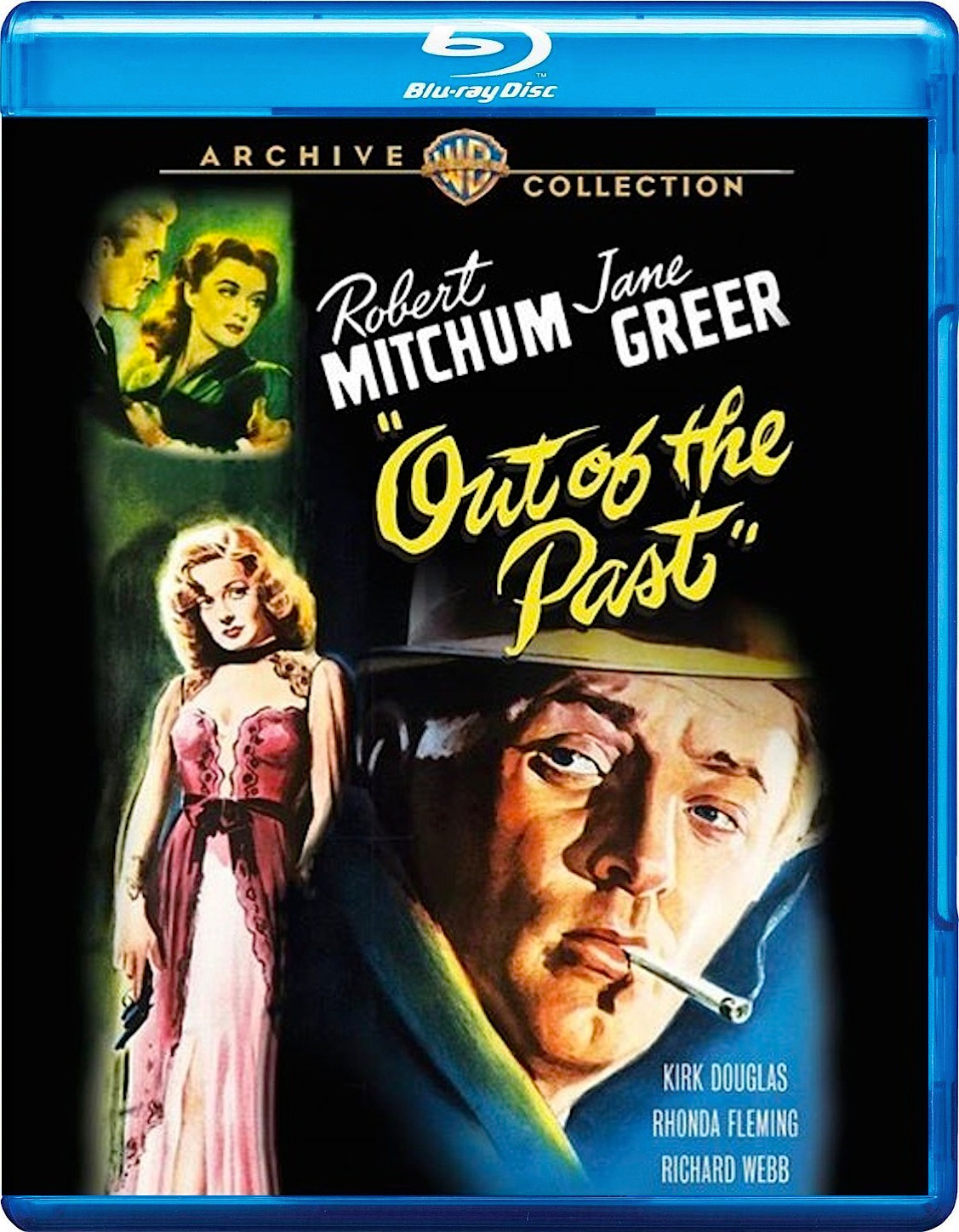
Directed by Jacques Tourneur
Written by Daniel Mainwaring
USA, 1947
Director Jacques Tourneur knew how to make the most out of a little, particularly when he was working in collaboration with producer Val Lewton (see Cat People, 1942, I Walked with a Zombie, 1943, and The Leopard Man, 1943). So when RKO gave this master of the low-budget picture a comparatively larger budget and a top-notch screenplay (by Daniel Mainwaring—as Geoffrey Homes—based on his own novel, “Build My Gallows High”) the result was one of the finest of all film noir.
Starring Robert Mitchum as Jeff and Jane Greer as Kathie, Out of the Past is built on a premise that is one of the defining characteristics of noir: the inevitability of an inescapable past. Such a device was often integral, with the repercussions of one’s recent deeds coming back to haunt them, but relatively rare was the film that was built purely around this convention, and even more unusual was the gap in time between one’s transgressions and their current life.
 When Jeff Bailey is first seen, he is an unassuming gas station owner with a mysterious background that doesn’t at all concern Ann Miller (Virginia Huston), the pleasant small-town girl he loves. The town is Bridgeport, California, a quiet, peaceful place, an ideal place to be and never leave, an ideal place to go when you don’t want to be found. Such are Jeff’s motivations. But when former acquaintance Joe (Paul Valentine) shows up, Jeff’s state of calm is upended. Bailey is revealed to be Markham and Jeff’s dark past comes to light.
When Jeff Bailey is first seen, he is an unassuming gas station owner with a mysterious background that doesn’t at all concern Ann Miller (Virginia Huston), the pleasant small-town girl he loves. The town is Bridgeport, California, a quiet, peaceful place, an ideal place to be and never leave, an ideal place to go when you don’t want to be found. Such are Jeff’s motivations. But when former acquaintance Joe (Paul Valentine) shows up, Jeff’s state of calm is upended. Bailey is revealed to be Markham and Jeff’s dark past comes to light.
Jeff is instructed to travel to Lake Tahoe to meet criminal boss Whit Sterling (Kirk Douglas). With Ann in tow, Jeff finally tells her who is he, where he came from, where they’re heading, and why it might not be a good thing. “You sure are a secretive man,” Ann tells Jeff earlier (she has no idea), but now he’s going to come clean. Ominously he warns her, “Some of it’s gonna hurt you,” and he proceeds.
Via voice-over and flashback (noir through and through), Jeff goes back three years prior, to when Whit hired him to find Kathie, Whit’s girl who made off with 40 grand of his money only after plugging him in the chest. Jeff is competent, so of course, he finds her, but he is also a man, and this is noir, and she is a quintessential femme fatale. They fall for each other and Jeff quickly disregards his obligation to Whit, knowing full well what will probably happen to Kathie if she is returned. Predictably, this brief liaison doesn’t end happily and the now murderous Kathie disappears. Cut to present day and Jeff is back with Whit at his Tahoe mansion. And so is Kathie. Whit again employs Jeff, but this time, Jeff is wiser and knows the game, and the name of the game is frame. Jeff knows he is being set up, but by playing dumb, he emerges smarter than everyone thinks, and he attempts to use incessant double crossing and dirty dealing to his favor. The past may have caught up with Jeff—his past partner, past deals, the past of his former associates—but he is convinced a future remains in reach.
 There are multiple reasons why Out of the Past is such an exemplary work in the world of noir, and part has to do with just how faithfully and inventively it adheres to the form. Ambiguous motives leave nearly everyone under suspicion, and when someone’s personal faults don’t trip them up, chance usually does. Mainwaring’s screenplay (with uncredited assistance from James M. Cain and Frank Fenton) has some of the snappiest quips of any noir, where everyone is witty and cracks wise at an unbelievable rate. For his part, Tourneur keeps Out of the Past visually appealing with imaginative camera angles and lighting that is deep and dark in the best noir tradition. Diverse settings in New York, Mexico, and California illustrate that no matter where one goes, the seamy and threatening look of noir, just like one’s past, is sure to follow. Locations also serve the purpose of reflecting Jeff’s dual nature and his conflicted desires, with Kathie and Ann personifying their respective backdrops of shadowy urban peril and secure rural tranquility; in other words, who Jeff was and what he hopes to be.
There are multiple reasons why Out of the Past is such an exemplary work in the world of noir, and part has to do with just how faithfully and inventively it adheres to the form. Ambiguous motives leave nearly everyone under suspicion, and when someone’s personal faults don’t trip them up, chance usually does. Mainwaring’s screenplay (with uncredited assistance from James M. Cain and Frank Fenton) has some of the snappiest quips of any noir, where everyone is witty and cracks wise at an unbelievable rate. For his part, Tourneur keeps Out of the Past visually appealing with imaginative camera angles and lighting that is deep and dark in the best noir tradition. Diverse settings in New York, Mexico, and California illustrate that no matter where one goes, the seamy and threatening look of noir, just like one’s past, is sure to follow. Locations also serve the purpose of reflecting Jeff’s dual nature and his conflicted desires, with Kathie and Ann personifying their respective backdrops of shadowy urban peril and secure rural tranquility; in other words, who Jeff was and what he hopes to be.
Robert Mitchum owns Out of the Past. After bit parts throughout the early 1940s, Mitchum paid his dues to earn more substantial roles, including his first and only Oscar nomination for Story of G.I. Joe (1945) and his turn in the excellent Crossfire, also from 1947. But here, we see the fleshing out of his characteristic cool, calm, seemingly detached bad-boy sensuality, just barely shrouding a capacity for wicked violence. This film would then serve as the catalyst for a career full of memorable performances: The Lusty Men (1952), River of No Return (1954), The Night of the Hunter (1955), Cape Fear (1962), El Dorado (1966), and so on, all the way up to Dead Man in 1995. Such a legendary acting career cannot, however, be applied to Huston or Greer, though Greer would amusingly appear in Taylor Hackford’s 1984 Out of the Past remake, Against All Odds. As for Kirk Douglas, this being only his second film role, it’s obviously safe to say he had much more ahead of him, including his first Oscar nomination for Champion just two years later.

